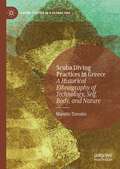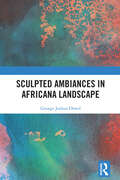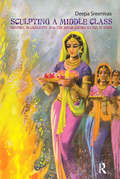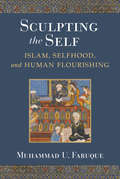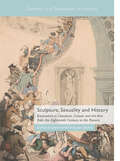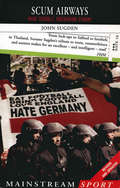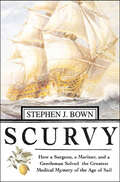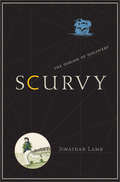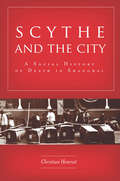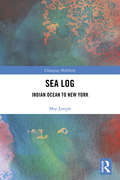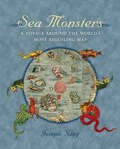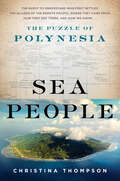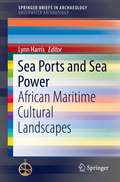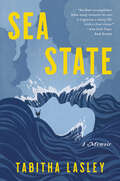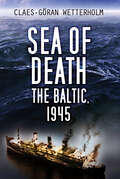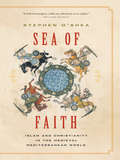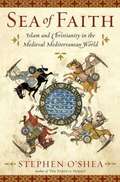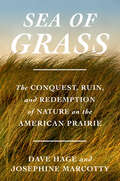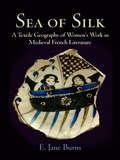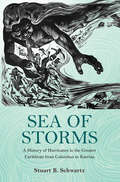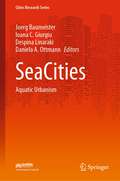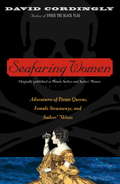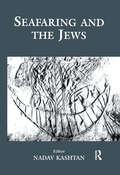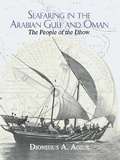- Table View
- List View
Scuba Diving Practices in Greece: A Historical Ethnography of Technology, Self, Body, and Nature (Leisure Studies in a Global Era)
by Manolis TzanakisThis book provides a historical-sociological analysis of recreational scuba diving practices. Starting from a national case study, Greece, the book analyzes the gradually evolving global institutional arrangements of this version of underwater recreational activities. Based on the author’s experience as a former diving instructor and on an historical and sociological research of scuba diving in Greece, the book examines the stages of institutionalization of scuba diving as a leisure practice on a global scale, from 1945 to the present day. It combines two traditions: the phenomenological approach of underwater multisensory embodied experience and tourism studies. The two main research questions that the project answers are (a) how scuba diving has historically been shaped as a leisure activity, (b) how has underwater experience been conceptually shaped as a leisure activity. This case is an excellent example for exploring the relationship between society, technology, body and modern practices of self in the late modernity world, under a phenomenological and historical perspective.
Sculpted Ambiances in Africana Landscape
by George Joshua OrwelSculpted Ambiances in Africana Landscape centers on ambiance as it affects the expanded sculptural field, particularly filling a gap in aesthetics left by a lack of focus on sculptures and installations in the Africana world and elsewhere.This book differentiates ambiance from other affective states and emotions and explores its production. It provides an introduction to the history of ambiance and vividly demonstrates, through immersive and experiential writing, how ambiance manifests in different artistic situations and social settings. The book considers the neglected and unique importance of sculptural ambiance to the history of Africana visual culture, and what these works mean in terms of their social, historical, cultural, political, and ecological imagination of space. The book is written in an episodic style and begins with a description of an image before presenting an analysis of the artist’s style and staging for ambient experience.This book will benefit college and university students; scholars of art, architecture, aesthetics, philosophy, geography, anthropology, and sociology; and curators and galleries.
Sculpting the Middle Class: History, Masculinity and the Amar Chitra Katha
by Deepa SreenivasThis book is an analysis of the Amar Chitra Katha genre, historical comic-books that capture and promote a middle class masculine identity, as culture became the new site for right-wing hegemonic politics in India over the last 4 decades of the 20th century.
Sculpting the Self: Islam, Selfhood, and Human Flourishing
by Muhammad FaruqueSculpting the Self addresses “what it means to be human” in a secular, post-Enlightenment world by exploring notions of self and subjectivity in Islamic and non-Islamic philosophical and mystical thought. Alongside detailed analyses of three major Islamic thinkers (Mulla ?adra, Shah Wali Allah, and Muhammad Iqbal), this study also situates their writings on selfhood within the wider constellation of related discussions in late modern and contemporary thought, engaging the seminal theoretical insights on the self by William James, Jean-Paul Sartre, and Michel Foucault. This allows the book to develop its inquiry within a spectrum theory of selfhood, incorporating bio-physiological, socio-cultural, and ethico-spiritual modes of discourse and meaning-construction. Weaving together insights from several disciplines such as religious studies, philosophy, anthropology, critical theory, and neuroscience, and arguing against views that narrowly restrict the self to a set of cognitive functions and abilities, this study proposes a multidimensional account of the self that offers new options for addressing central issues in the contemporary world, including spirituality, human flourishing, and meaning in life. This is the first book-length treatment of selfhood in Islamic thought that draws on a wealth of primary source texts in Arabic, Persian, Urdu, Greek, and other languages. Muhammad U. Faruque’s interdisciplinary approach makes a significant contribution to the growing field of cross-cultural dialogue, as it opens up the way for engaging premodern and modern Islamic sources from a contemporary perspective by going beyond the exegesis of historical materials. He initiates a critical conversation between new insights into human nature as developed in neuroscience and modern philosophical literature and millennia-old Islamic perspectives on the self, consciousness, and human flourishing as developed in Islamic philosophical, mystical, and literary traditions.
Sculpture, Sexuality and History: Encounters in Literature, Culture and the Arts from the Eighteenth Century to the Present (Genders and Sexualities in History)
by Jana Funke Jen GroveThis book investigates the wide-ranging connections between sculpture, sexuality, and history in Western culture from the eighteenth century to the present. Sculpture has offered a privileged site for the articulation of sexual experience and the formation of sexual knowledge. As historical objects, sculptures also draw attention to the different ways in which knowledge about sexuality is facilitated through an engagement with the past. Bringing together contributors from across disciplines, including art history, classics, film studies, gender studies, history, literary studies, museum studies, queer theory and reception studies, the volume presents original readings of sculptural art in relation to antiquarianism, aesthetics, collecting cultures, censorship and obscenity, psychoanalysis, sexology, and the experience and regulation of museum spaces. It examines how sculptural encounters were imagined and articulated in literature, painting, film and science. As a whole, the book opens up a new understanding of the ways in which sculptures, as real or imagined objects, have fundamentally shaped approaches to and receptions of the past in relation to sex, gender and sexuality.Chapters 8 and 10 of this book are available open access under a CC BY 4.0 license at link.springer.com.
Scum Airways: Inside Football's Underground Economy
by John SugdenFootball is big business and it doesn't come much bigger than Manchester United – commercial giants and the richest club in the world. But in the shadow of Old Trafford a black economy is growing to rival the commercial power of the official sales channels. Scum Airways is an inside investigation of the Manchester grafters – touts, black marketeers and shady dealers – who, led by characters like 'Big Tommy', have come up with a remarkably successful money-making venture: Scum Airways. With the expansion of the Champions League came the opportunity for the grafters to move from ticket touting and producing 'unofficial' replica kits into the independent travel business. International Travel is the company for those who, through choice or because of their police records prohibit them, do not travel with the official clubs. Their customers include many 'straight' supporters of Leeds United, arch-rivals of Man U, but Tommy's core clients are the 'Lads' - die-hard 30-something football hooligans. Scum Airways follows the exploits and adventures of Big Tommy and his team of grafters as they continue to build their empire. John Sugden went along for the ride and provides startling insights into professional football's burgeoning black economy. From Munich to Madrid, Amsterdam to Bangkok, through to the streets and bars of Toyko and Sapporo during the 2002 World Cup, and beyond, Scum Airways reveals the dark side of the football business.
Scurvy: How a Surgeon, a Mariner, and a Gentlemen Solved the Greatest Medical Mystery of the Age of Sail
by Stephen J. BownScurvy took a terrible toll in the Age of Sail, killing more sailors than were lost in all sea battles combined. The threat of the disease kept ships close to home and doomed those vessels that ventured too far from port. The willful ignorance of the royal medical elite, who endorsed ludicrous medical theories based on speculative research while ignoring the life-saving properties of citrus fruit, cost tens of thousands of lives and altered the course of many battles at sea. The cure for scurvy ranks among the greatest of human accomplishments, yet its impact on history has, until now, been largely ignored. From the earliest recorded appearance of the disease in the sixteenth century, to the eighteenth century, where a man had only half a chance of surviving the scourge, to the early nineteenth century, when the British conquered scurvy and successfully blockaded the French and defeated Napoleon, Scurvy is a medical detective story for the ages, the fascinating true story of how James Lind (the surgeon), James Cook (the mariner), and Gilbert Blane (the gentleman) worked separately to eliminate the dreaded affliction. Scurvy is an evocative journey back to the era of wooden ships and sails, when the disease infiltrated every aspect of seafaring life: press gangs "recruit" mariners on the way home from a late night at the pub; a terrible voyage in search of riches ends with a hobbled fleet and half the crew heaved overboard; Cook majestically travels the South Seas but suffers an unimaginable fate. Brimming with tales of ships, sailors, and baffling bureaucracy, Scurvy is a rare mix of compelling history and classic adventure story.
Scurvy: The Disease of Discovery
by Jonathan LambScurvy, a disease often associated with long stretches of maritime travel, generated sensations exceeding the standard of what was normal. Eyes dazzled, skin was morbidly sensitive, emotions veered between disgust and delight. In this book, Jonathan Lamb presents an intellectual history of scurvy unlike any other, probing the speechless encounter with powerful sensations to tell the story of the disease that its victims couldn't because they found their illness too terrible and, in some cases, too exciting.Drawing on historical accounts from scientists and voyagers as well as major literary works, Lamb traces the cultural impact of scurvy during the eighteenth-century age of geographical and scientific discovery. He explains the medical knowledge surrounding scurvy and the debates about its cause, prevention, and attempted cures. He vividly describes the phenomenon and experience of "scorbutic nostalgia," in which victims imagined mirages of food, water, or home, and then wept when such pleasures proved impossible to consume or reach. Lamb argues that a culture of scurvy arose in the colony of Australia, which was prey to the disease in its early years, and identifies a literature of scurvy in the works of such figures as Herman Melville, Samuel Taylor Coleridge, Francis Bacon, and Jonathan Swift.Masterful and illuminating, Scurvy shows how the journeys of discovery in the eighteenth century not only ventured outward to the ends of the earth, but were also an inward voyage into the realms of sensation and passion.
Scylla
by Marianne Govers HopmanWhat's in a name? Using the example of a famous monster from Greek myth, this book challenges the dominant view that a mythical symbol denotes a single, clear-cut 'figure' and proposes instead to define the name 'Scylla' as a combination of three concepts – sea, dog and woman – whose articulation changes over time. While archaic and classical Greek versions usually emphasize the metaphorical coherence of Scylla's components, the name is increasingly treated as a well-defined but also paradoxical construct from the late fourth century BCE onward. Proceeding through detailed analyses of Greek and Roman texts and images, Professor Hopman shows how the same name can variously express anxieties about the sea, dogs, aggressive women and shy maidens, thus offering an empirical response to the semiotic puzzle raised by non-referential proper names.
Scythe and the City: A Social History of Death in Shanghai
by Christian HenriotThe issue of death has loomed large in Chinese cities in the modern era. Throughout the Republican period, Shanghai swallowed up lives by the thousands. Exposed bodies strewn around in public spaces were a threat to social order as well as to public health. In a place where every group had its own beliefs and set of death and funeral practices, how did they adapt to a modern, urbanized environment? How did the interactions of social organizations and state authorities manage these new ways of thinking and acting? Recent historiography has almost completely ignored the ways in which death created such immense social change in China. Now, Scythe and the City corrects this problem. Christian Henriot's pioneering and original study of Shanghai between 1865 and 1965 offers new insights into this crucial aspect of modern society in a global commercial hub and guides readers through this tumultuous era that radically redefined the Chinese relationship with death.
Sea Log: Indian Ocean to New York (Changing Mobilities)
by May JosephThe ocean has always been the harbinger of strangers to new shores. Migrations by sea have transformed modern conceptions of mobility and belonging, disrupting notions of how to write about movement, memory and displaced histories. Sea Log is a memory theater of repressive hauntings based on urban artifacts across a maritime archive of Dutch and Portuguese colonial pillage. Colonial incursions from the sea, and the postcolonial aftershocks of these violent sea histories, lie largely forgotten for most formerly colonized coastal communities around the world. Offering a feminist log of sea journeys from the Malabar Coast of South India, through the Atlantic to the North Sea, May Joseph writes a navigational history of postcolonial coastal displacements. Excavating Dutch, Portuguese, Arab, Asian and African influences along the Malabar Coast, Joseph unearths the undertow of colonialism’s ruins. In Sea Log, the Bosphorus, the Tagus and the Amstel find coherence alongside the Arabian Sea and the Indian Ocean. Written in a clear and direct style, this volume will appeal to historians of transnational communities, as well as students and scholars of cultural studies, anthropology of space, area studies, maritime history and postcolonial studies.
Sea Monsters: A Voyage around the World's Most Beguiling Map
by Joseph NiggThe mythic creature expert and author of Phoenix takes readers through a bestiary of sea monsters featured on the famous 16th century map Carta Marina. In the sixteenth century, sea serpents, giant man-eating lobsters, and other monsters were thought to swim the waters of Norther Europe, threatening seafarers who ventured too far from shore. Thankfully, Scandinavian mariners had Olaus Magnus, who in 1539 charted these fantastic marine animals in his influential map of the Nordic countries, the Carta Marina. In Sea Monsters, mythologist Joseph Nigg brings readers face-to-face with these creatures and other magnificent components of Magnus&’s map. Nearly two meters wide in total, the map&’s nine wood-block panels comprise the largest and first realistic portrayal of the region. But in addition to its important geographic significance, Magnus&’s map goes beyond cartography to scenes both domestic and mystic. Close to shore, Magnus shows humans interacting with common sea life—boats struggling to stay afloat, merchants trading, children swimming, and fisherman pulling lines. But from the offshore deeps rise some of the most terrifying sea creatures imaginable—like sea swine, whales as large as islands, and the Kraken. In this book, Nigg draws on Magnus&’s own text to further describe and illuminate these inventive scenes and to flesh out the stories of the monsters.Sea Monsters is a stunning tour of a world that still holds many secrets for us land dwellers, who will forever be fascinated by reports of giant squid and the real-life creatures of the deep that have proven to be as bizarre and otherworldly as we have imagined for centuries. It is a gorgeous guide for enthusiasts of maps, monsters, and the mythic. &“[A] beautiful new exploration of the Carta Marina.&”—Wired
Sea People: The Puzzle of Polynesia
by Christina ThompsonA blend of Jared Diamond’s Guns, Germs, and Steel and Simon Winchester’s Pacific, a thrilling intellectual detective story that looks deep into the past to uncover who first settled the islands of the remote Pacific, where they came from, how they got there, and how we know. For more than a millennium, Polynesians have occupied the remotest islands in the Pacific Ocean, a vast triangle stretching from Hawaii to New Zealand to Easter Island. Until the arrival of European explorers they were the only people to have ever lived there. Both the most closely related and the most widely dispersed people in the world before the era of mass migration, Polynesians can trace their roots to a group of epic voyagers who ventured out into the unknown in one of the greatest adventures in human history. How did the earliest Polynesians find and colonize these far-flung islands? How did a people without writing or metal tools conquer the largest ocean in the world? This conundrum, which came to be known as the Problem of Polynesian Origins, emerged in the eighteenth century as one of the great geographical mysteries of mankind.For Christina Thompson, this mystery is personal: her Maori husband and their sons descend directly from these ancient navigators. In Sea People, Thompson explores the fascinating story of these ancestors, as well as those of the many sailors, linguists, archaeologists, folklorists, biologists, and geographers who have puzzled over this history for three hundred years. A masterful mix of history, geography, anthropology, and the science of navigation, Sea People combines the thrill of exploration with the drama of discovery in a vivid tour of one of the most captivating regions in the world.Sea People includes an 8-page photo insert, illustrations throughout, and 2 endpaper maps.
Sea Ports and Sea Power
by Lynn HarrisThis volume represents a more Africanist approach to the framework of maritime landscapes and challenges of adapting international heritage policy such as the UNESCO convention. While the concept of a maritime landscape is very broad, a more focused thematic strategy draws together a number of case studies in South Africa, Namibia, Tanzania, and Nigeria with a common thread. Specifically, the contributors address the sub-theme of sea ports and sea power as part of understanding the African maritime landscape. Sea ports and surrounds are dynamic centers of maritime culture supporting a rich diversity of cultural groups and economic activities. Strategic locations along the African coastline have associations with indigenous maritime communities and trade centers, colonial power struggles and skirmishes, establishment of naval bases and operations, and World War I and II engagements.
Sea State: A Memoir
by Tabitha LasleyA Recommended Read from: Vogue * The Los Angeles Times * Publishers Weekly * The Week * Lit HubA stunning and brutally honest memoir that shines a light on what happens when female desire conflicts with a culture of masculinity in crisisIn her midthirties and newly free from a terrible relationship, Tabitha Lasley quit her job at a London magazine, packed her bags, and poured her savings into a six-month lease on an apartment in Aberdeen, Scotland. She decided to make good on a long-deferred idea for a book about oil rigs and the men who work on them. Why oil rigs? She wanted to see what men were like with no women around.In Aberdeen, Tabitha became deeply entrenched in the world of roughnecks, a teeming subculture rich with brawls, hard labor, and competition. The longer she stayed, the more she found her presence had a destabilizing effect on the men—and her.Sea State is on the one hand a portrait of an overlooked industry: “offshore” is a way of life for generations of primarily working-class men and also a potent metaphor for those parts of life we keep at bay—class, masculinity, the transactions of desire, and the awful slipperiness of a ladder that could, if we tried hard enough, lead us to security.Sea State is on the other hand the story of a journalist whose professional distance from her subject becomes perilously thin. In Aberdeen, Tabitha gets high and dances with abandon, reliving her youth, when the music was good and the boys were bad. Twenty years on, there is Caden: a married rig worker who spends three weeks on and three weeks off. Alone and in an increasingly precarious state, Tabitha dives into their growing attraction. The relationship, reckless and explosive, will lay them both bare.
Sea of Death: The Baltic, 1945
by Claes-Göran WetterholmAmid the turmoil of the dying days of the Second World War, a series of ships were sunk in the Baltic. These terrible disasters add up to be the greatest loss of life ever recorded at sea, but the stories of these ships have been lost from view. While everyone recognises the name Titanic, the names Cap Arcona, Goya,General von Steuben and Thielbek draw little more than blank stares.Claes-Göran Wetterholm brings the horror of these tragic events to life in this gripping study, first published in Swedish, as he collates the unknown stories of four major shipping disasters, the most terrible in history. Combining archive research with interviews with survivors and the relatives of those who died, Wetterholm vividly conveys his experiences of meeting many witnesses to a forgotten and horrifying piece of history.
Sea of Faith
by Stephen O'SheaFrom the best-selling author of The Perfect Heresy, and in the spirit of Barbara Tuchman's A Distant Mirror, a rich narrative account of the millennium of religious wars that destroyed the Byzantine Empire while shaping the Muslim/Christian conflict that haunts us still.The Medieval Mediterranean was a sea of two faiths: Christianity and Islam. Though bitter rivals, they shared a common history. Here are the epochal moments during that 1000-year struggle: the fall of the Christian Middle East at Yarmuk, Martel's "wall of ice" at Poitiers, Byzantium's rout at Manzikert, all the way through to Saladin at Jerusalem, Lazar at Kosovo and the suicidal defence of Malta against the Ottomans. Stephen O'Shea tells a riveting story, which stretches from Syria and Israel to France and Morocco. Today, the two faiths again collide.Sea of Faith is a magnificent work of popular history and a timely reminder of our shared past.
Sea of Faith: The Shared Story of Christianity and Islam in the Medieval Mediterranean World
by Stephen O'SheaAuthor explains the meeting of minds and the collisions of armies that marked the interaction of Cross and Crescent in the Middle Ages. He also recounts seven battles between the forces of Christianity and Islam that shaped the Mediterranean world.
Sea of Grass: The Conquest, Ruin, and Redemption of Nature on the American Prairie
by Dave Hage Josephine MarcottyA vivid portrait of the American prairie, which rivals the rainforest in its biological diversity and, with little notice, is disappearing even faster&“This book describes—in loving, living prose—one of the world&’s greatest and most important landscapes. And it does so while there&’s still time to save some serious part of it.&”—Bill McKibben, author of The End of NatureThe North American prairie is an ecological marvel, a lush carpet of grass that stretches to the horizon, and home to some of the nation&’s most iconic creatures—bison, elk, wolves, pronghorn, prairie dogs, and bald eagles. Plants, microbes, and animals together made the grasslands one of the richest ecosystems on Earth and a massive carbon sink, but the constant expansion of agriculture threatens what remains.When European settlers encountered the prairie nearly two hundred years ago, rather than a natural wonder they saw an alien and forbidding place. But with the steel plow, artificial drainage, and fertilizers, they converted the prairie into some of the world&’s most productive farmland—a transformation unprecedented in human history. American farmers fed the industrial revolution and made North America a global breadbasket, but at a terrible cost: the forced dislocation of Indigenous peoples, pollution of great rivers, and catastrophic loss of wildlife. Today, industrial agriculture continues its assault on the prairie, plowing up one million acres of grassland a year. Farmers can protect this extraordinary landscape, but trying new ideas can mean ruin in a business with razor-thin margins, and will require help from Washington, D.C., and from consumers.Veteran journalists and midwesterners Dave Hage and Josephine Marcotty reveal humanity&’s relationship with this incredible land, offering a deep, compassionate analysis of the difficult decisions as well as opportunities facing agricultural and Indigenous communities. Sea of Grass is a vivid portrait of a miraculous ecosystem that makes clear why the future of this region is of essential concern far beyond the heartland.
Sea of Silk
by E. Jane BurnsThe story of silk is an old and familiar one, a tale involving mercantile travel and commercial exchange along the broad land mass that connects ancient China to the west and extending eventually to sites on the eastern Mediterranean and along sea routes to India. But if we shift our focus from economic histories that chart the exchange of silk along Asian and Mediterranean trade routes to medieval literary depictions of silk, a strikingly different picture comes into view. In Old French literary texts from the twelfth and thirteenth centuries, emphasis falls on production rather than trade and on female protagonists who make, decorate, and handle silk.Sea of Silk maps a textile geography of silk work done by these fictional women. Situated in northern France and across the medieval Mediterranean, from Saint-Denis to Constantinople, from North Africa to Muslim Spain, and even from the fantasy realm of Arthurian romance to the historical silkworks of the Norman kings in Palermo, these medieval heroines provide important glimpses of distant economic and cultural geographies. E. Jane Burns argues, in brief, that literary portraits of medieval heroines who produce and decorate silk cloth or otherwise manipulate items of silk outline a metaphorical geography that includes France as an important cultural player in the silk economics of the Mediterranean.Within this literary sea of silk, female protagonists who "work" silk in a variety of ways often deploy it successfully as a social and cultural currency that enables them to traverse religious and political barriers while also crossing lines of gender and class.
Sea of Storms
by Stuart B. SchwartzThe diverse cultures of the Caribbean have been shaped as much by hurricanes as they have by diplomacy, commerce, or the legacy of colonial rule. In this panoramic work of social history, Stuart Schwartz examines how Caribbean societies have responded to the dangers of hurricanes, and how these destructive storms have influenced the region's history, from the rise of plantations, to slavery and its abolition, to migrations, racial conflict, and war.Taking readers from the voyages of Columbus to the devastation of Hurricane Katrina, Schwartz looks at the ethical, political, and economic challenges that hurricanes posed to the Caribbean's indigenous populations and the different European peoples who ventured to the New World to exploit its riches. He describes how the United States provided the model for responding to environmental threats when it emerged as a major power and began to exert its influence over the Caribbean in the nineteenth century, and how the region's governments came to assume greater responsibilities for prevention and relief, efforts that by the end of the twentieth century were being questioned by free-market neoliberals. Schwartz sheds light on catastrophes like Katrina by framing them within a long and contentious history of human interaction with the natural world.Spanning more than five centuries and drawing on extensive archival research in Europe and the Americas, Sea of Storms emphasizes the continuing role of race, social inequality, and economic ideology in the shaping of our responses to natural disaster.Some images inside the book are unavailable due to digital copyright restrictions.
SeaCities: Aquatic Urbanism (Cities Research Series)
by Joerg Baumeister Daniela A. Ottmann Ioana C. Giurgiu Despina LinarakiThis book highlights the research outcome of Cities Research Institute's SeaCities group at Griffith University and a panel with the same title which took place at the World Expo in Dubai 2021/22 supported by the UN. It reflects on topics which are relevant for a future aquatic urbanism like the evolution of a taxonomy for aquatic urbanism, island and ecological wetland development, the planning aspects of seascapes, as well as drivers for floating communities and aquacultural urbanism. The book broadens the perspective of the previous book "SeaCities: Urban Tactics for Sea-Level Rise" published in 2021 from a terrestrial towards an amphibious and aquatic understanding of future city development.
Seafaring Women: Adventures of Pirate Queens, Female Stowaways, and Sailors' Wives
by David CordinglyFor centuries, the sea has been regarded as a male domain, but in this illuminating historical narrative, maritime scholar David Cordingly shows that an astonishing number of women went to sea in the great age of sail. Some traveled as the wives or mistresses of captains; others were smuggled aboard by officers or seamen. And Cordingly has unearthed stories of a number of young women who dressed in men's clothes and worked alongside sailors for months, sometimes years, without ever revealing their gender. His tremendous research shows that there was indeed a thriving female population--from pirates to the sirens of myth and legend--on and around the high seas. A landmark work of women's history disguised as a spectacularly entertaining yarn, Women Sailors and Sailor's Women will surprise and delight.
Seafaring and the Jews
by Nadav KashtanThis collection studies Jewish involvement in seafaring from Biblical, through Greco-Roman, Medieval and Early Modern periods to the present. This broad historical perspective allows a closer look at various attitudes of Jews to maritime activities, especially as shipowners and traders in the Mediterranean regions.
Seafaring in the Arabian Gulf and Oman: People of the Dhow
by Dionisius A. AgiusThis book is a study of the seafaring communities of the Arabian Gulf and Oman in the past 150 years. It analyses the significance of the dhow and how coastal communities interacted throughout their long tradition of seafaring. In addition to archival material, the work is based on extensive field research in which the voices of seamen were recorded in over 200 interviews. The book provides an integrated study of dhow activity in the area concerned and examines the consciousness of belonging to the wider culture of the Indian ocean as it is expressed in boat-building traditions, navigational techniques, crew organisation and port towns. People of the Dhow brings together the different measures of time past, the sea, its people and their material culture. The Arabian Gulf and Oman have traditionally shared a common destiny within the Western Indian Ocean. The seasonal monsoonal winds were fundamental to the physical and human unities of the seafaring communities, producing a way of life in harmony with the natural world, a world which was abruptly changed with the discovery of oil. What remains is memories of a seafaring past, a history of traditions and customs recorded here in the recollections of a dying generation and in the rich artistic heritage of the region.
